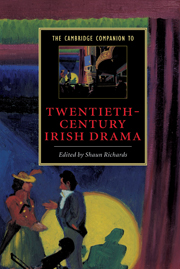Book contents
- Frontmatter
- 1 Plays of (ever) changing Ireland
- 2 Late nineteenth-century Irish theatre: before the Abbey – and beyond
- 3 The ideology of the Abbey Theatre
- 4 The theatre of William Butler Yeats
- 5 Lady Gregory’s Abbey Theatre drama: Ireland real and ideal
- 6 J. M. Synge, ‘national’ drama and the post-Protestant imagination
- 7 On the siting of doors and windows: aesthetics, ideology and Irish stage design
- 8 Oscar Wilde and the politics of style
- 9 George Bernard Shaw and Ireland
- 10 Sean O’Casey’s Dublin Trilogy: disillusionment to delusion
- 11 Ireland’s ‘exiled’ women playwrights: Teresa Deevy and Marina Carr
- 12 Samuel Beckett and the countertradition
- 13 Brian Friel’s sense of place
- 14 The Field Day Theatre Company
- 15 Tom Murphy and the children of loss
- 16 Reconstructing history in the Irish history play
- 17 The Abbey Theatre and the Irish state
- 18 Staging contemporary Ireland
- 19 The Revival revised
- Guide to further reading
- Index
- Series List
17 - The Abbey Theatre and the Irish state
Published online by Cambridge University Press: 28 May 2006
- Frontmatter
- 1 Plays of (ever) changing Ireland
- 2 Late nineteenth-century Irish theatre: before the Abbey – and beyond
- 3 The ideology of the Abbey Theatre
- 4 The theatre of William Butler Yeats
- 5 Lady Gregory’s Abbey Theatre drama: Ireland real and ideal
- 6 J. M. Synge, ‘national’ drama and the post-Protestant imagination
- 7 On the siting of doors and windows: aesthetics, ideology and Irish stage design
- 8 Oscar Wilde and the politics of style
- 9 George Bernard Shaw and Ireland
- 10 Sean O’Casey’s Dublin Trilogy: disillusionment to delusion
- 11 Ireland’s ‘exiled’ women playwrights: Teresa Deevy and Marina Carr
- 12 Samuel Beckett and the countertradition
- 13 Brian Friel’s sense of place
- 14 The Field Day Theatre Company
- 15 Tom Murphy and the children of loss
- 16 Reconstructing history in the Irish history play
- 17 The Abbey Theatre and the Irish state
- 18 Staging contemporary Ireland
- 19 The Revival revised
- Guide to further reading
- Index
- Series List
Summary
Since the mid-1990s Dublin's Abbey and Peacock Theatres, known formally as the National Theatre Society Limited (NTS) and since 1997 marketed under the title 'The National Theatre', have received approximately £2.5 million per year in state funding. Although occasional debates are held concerning the appropriateness of dedicating this amount of public monies to the NTS in relation to the funding of other Irish theatres, or in relation to other arts activities in the Republic of Ireland, more fundamental issues - such as the question of whether or not the state should support a national theatre in the first place, and the political implications of such support - are generally neglected. Accordingly, this chapter sets out to examine the history of the national theatre movement in terms of its relationship to the state before and after independence, and will consider especially the implications of state support for the role of the national theatre as a forum for social and political critique. My argument is that the determining power of the state is the Abbey Theatre's most important and revealing context, and that this also helps to explain certain dominant trends in twentieth-century Irish playwriting.
Clearly, a national theatre may fulfil many different political and cultural functions, but its primary purpose is to operate as a prestige site for the performance of a society’s representative dramatic narratives. Such an operation is useful to the authority of the state in so far as these narratives are designed to engender in their audience an atmosphere of unity and national agreement.
- Type
- Chapter
- Information
- The Cambridge Companion to Twentieth-Century Irish Drama , pp. 231 - 243Publisher: Cambridge University PressPrint publication year: 2004



